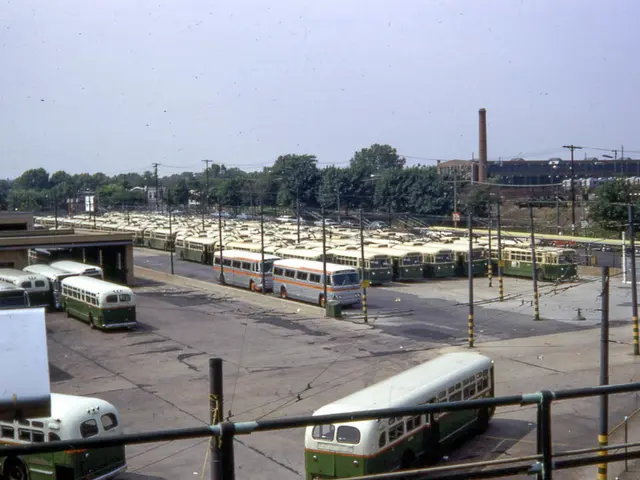Catastrophic aftermath of freight train derailment in Gotthard
Spread the Word:
The 2023 mishap at the Gotthard Tunnel left the Swiss Federal Railways (SBB) and infrastructure buried in millions in damage, and a tube closed for multiple months. Instead of standing idle, SBB's now taking action to avoid a reoccurrence of the disaster.
After a freight train accident in the Gotthard tunnel about two years ago, one tube was closed for several months. To prevent such incidents in the future, the SBB is now intensifying inspections and is planning to phase out the current braking system for freight wagons. The SBB's move follows the Swiss Safety Investigation Authority (Sust) report, stating that Europe is now compelled to act as well.
A Detailed Look at the Tragic Accident
The final report reveals that the failed wheel hub of wagon eleven on a freight train from Italy was the reason for the accident in August 2023[1]. Despite inspections, a deep crack in the wheel went unnoticed. The accident at the Faido track change point in Ticino, Switzerland, disintegrated the train, with the front part continuing and the rear part crashing into the wall of the tunnel tube.
Phasing out the Problematic Brake Blocks
The disaster was a systemic problem, as further examinations uncovered cracks in other wheels of the derailed wagon eleven[2]. The issue leading to the crack was the material of the braking system: noise-reducing brake blocks made of plastic. Germany's DB Cargo also employs this brake type, with approximately 60,000 freight wagons sporting these brake blocks[2]. Now, the SBB wants to remove freight wagons with this brake type from service due to the elevated risks. Over one-fifth of the wagons used by SBB Cargo are affected[2].
Increased Inspections for Improved Safety
To prevent accidents, Sust demands increased inspections of wheels, brakes, and their materials. This is the right approach, says Michael Müller from the Swiss Federal Office of Transport. With over 600,000 wagons moving goods by rail in Europe, this issue requires a broader international perspective[2][4].
Meanwhile, the SBB has launched another initiative in the Swiss parliament, targeting the owners of wagons by involving them in the costs of accidents to stimulate more attention to safety[3]. However, the European Railway Agency remains absent in the action so far.
The accident in the Gotthard Base Tunnel on August 10, 2023, inflicted severe damages totaling around 150 million Swiss francs, took 42 days to recover the wreckage, and resulted in a year-long closure of the tube. Meanwhile, trains were rerouted via the Gotthard mountain route, causing longer travel times[5]. It wasn't until September 2, 2024, over a year later, that the tunnel was operational again.
dreiland-aktuell reported on the final report of the incident on June 7, 2025[5].
[Disclaimer: Information presented here is for informational purposes only and does not reflect the viewpoints of the writer.]*
Top Stories Trending Now Local News
- The failed wheel hub of a freight train carrying goods from Italy, equipped with noise-reducing brake blocks made of plastic, was the cause of the devastating accident in the Gotthard Base Tunnel in 2023.
- To prevent future accidents, SBB is planning to phase out freight wagons with the problematic brake blocks in their fleet, affecting over one-fifth of their wagons, and is advocating for increased inspections of wheels, brakes, and their materials in the European railway industry.
- General news outlets have reported on the Swiss Safety Investigation Authority's (Sust) recommendations that Europe must now act to improve safety measures in the transportation industry, following the Gotthard Tunnel accident and the subsequent report pointing to finance, transportation, and the use of specific materials in the freight wagon industry as areas for potential improvement.







